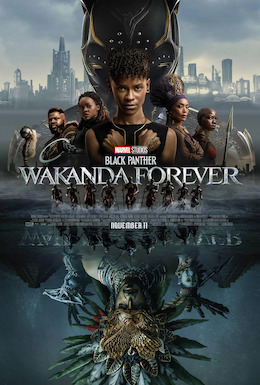Following
the death of T’Challa (Chadwick Boseman), Wakanda’s king and protector, the
nation falls into despair as his mother, Queen Ramonda (Angela Bassett), faces
a world hungry for the country’s rare metal, vibranium. The pursuit of an
alternate vibranium source leads Americans to the secretive underwater kingdom
of Talokan, whose ruler Namor (Tenoch Huerta) urges Wakanda to ally against
outside threats or else face devastation. However, Princess Shuri
(Letitia Wright) instead decamps to the U.S. with General Okoye (Danai Guirira)
on a mission to locate and rescue the teen genius (Dominique Thorne) behind the
government’s vibranium detector before Namor’s forces can do her harm.
While
writer/director Ryan Coogler’s Black Panther was a culturally resonant
hit in 2018, lead actor Boseman’s 2020 death from colon cancer cast a long
shadow over the second installment. The film tastefully honors his passing,
but it also makes Wakanda Forever, at times, a very heavy affair. There
is still plenty of visual spectacle to behold here along with several strong
performances, but this cannot help but feel like a too-long (161 minutes) film
that tries to do too much.
While Thorne’s
Riri Williams seems rushed and shoehorned into her Iron Man successor role, the
film’s character development is otherwise an asset with acting to match. Those
(James Cameron the latest among them) who are quick to dismiss Marvel movies as
emotionally stunted juvenilia should pay close attention to Bassett’s
powerhouse performance here as a strong leader and grieving mother whose best
intentions have catastrophic consequences. Namor, Marvel’s first antihero
(dating back to the 1930s!), is usually depicted in the source material as
ambiguously East Asian, so the switch to a Mesoamerican background (he’s
synthesized with the Mayan god Kukulkan here) may be less about representation
and more about separating him from his DC equivalent, Aquaman. At any rate,
Huerta is both disarmingly genial and coldly and ruthlessly dedicated to
protecting his people, a complexity that frees him from the generic megalomania
that has plagued many a villain and that engenders sympathy. Wright, who shifts
from smart-aleck sidekick/foil to a guilt-ridden leadership role, is outshined,
but she does give her character more dimensionality, and the same can be said
for Lupita Nyong’o as T’Challa’s friend and lover Nakia, an ex-spy living
abroad. And for those who enjoyed his trollish performance the last time around, Winston Duke's M'Baku returns to do more scene-stealing as well.
Visually, Wakanda
Forever combines the silly and the sublime. The warriors of Talokan appear
blue when on land, which invites unfortunate Avatar comparisons. Whereas
the first Black Panther suffered from decidedly dodgy CGI animals, the
fauna don’t look as bad here; they are just used in ridiculous ways
(whales as troop transports, anyone?). That said, Talokan’s first appearance is
grippingly suspenseful, and the movie’s grand battles are gripping and majestic.
There is, however, a sense that they could be shaved by a few minutes to speed
the movie along as by the 150 minute-mark, Wakanda Forever feels as if
it will go on….you get the idea.
Between
Boseman’s death, COVID-related production delays, and the taint of Wright’s
anti-vax activism, Coogler faced an extraordinarily difficult path in bringing Wakanda
Forever to the screen. What he was able to achieve is commendable even if
this film lacks some of its predecessor’s vibrance and cachet.

No comments:
Post a Comment